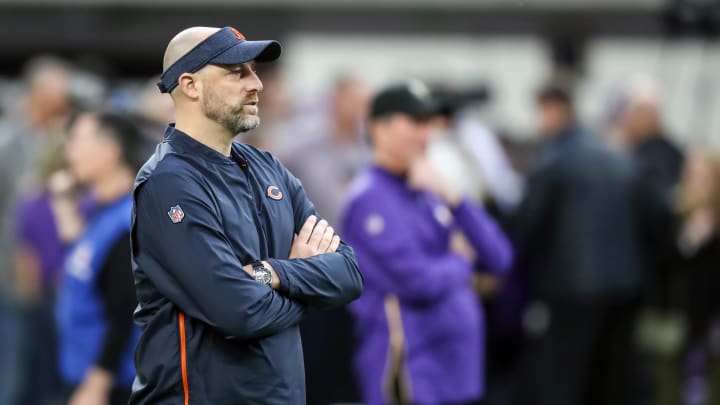The Case for Matt Nagy Calling Plays This Week

Matt Nagy's open attitude toward changing play callers is no different than the last time his play calling came into question.
After the offense failed completely against the Los Angeles Rams and produced three points, he said basically the same thing about calling plays as he said Monday following Sunday's 24-17 loss to the Tennessee Titans.
The main difference in this case was he seemed even more frustrated over the offense's difficulties.
After the loss to the Rams, Nagy said: "As any competitor, and I'm as competitive a person as there is, that's the part where I have to challenge myself to stay patient and challenge myself to not get frustrated, as well, and continue to keep coaching to the best I can and look at everything."
The key word in this is his call for patience. It's what Nick Foles has said all along.
Nagy needs to follow his own advice now more than ever.
It's not easy to stay the course now and be patient, but there is no reason to expect any better result from their offense with someone else calling plays and there are four reasons why.
1. The Offensive Line
The Bears could have had any other play caller in NFL history and would not have succeeded against Tennessee with that offensive line.
They had two linemen with no NFL experience starting, one of those playing a position he never played even in high school. How is a player who never had to worry about such things supposed handle changing blocking assignments at the line according to what he sees ini defensive fronts?
It's impossible without any experience, but this was Bars' assignment. Bars lacks real NFL experience anywhere let alone at center. He had been in 13 games previously but all were at other positions, a total of only 45 plays without a single start.
Until Sunday, Arlington Hambright was a scout team player.
Rashaad Coward had been converted to right tackle from defense after starting out as a defensive lineman in 2017, but his only experience playing tackle against NFL competition had been in practice. He had only played guard in games and didn't have to face edge rushers in the past under live conditions.
They had Germain Ifedi starting with one day of practice. He had been put on Reserve/COVID-19, early in the week and had one day to get ready. Those Friday practices are usually focused on special situations like red zone, goal line, or third and fourth down. They're usually shorter. So Ifedi missed virtually all on-field work.
The whole tattered line had one less day of practice than normal.
"I think the hardest part is just playing together and, you know, offensive line play is a big communications (task)," offensive line coach Juan Castillo said. "So sometimes where all the sudden you really had three guys, you had two guys starting that were new and another guy starting at a new position so I think the hard part was being able to have the communication.
"We had that (problem) on one of the early runs, you know, where the communication part, you know? Arlington's still young, the center said something, he didn't get it."
With that backdrop, the line couldn't block the run. An NFL offense with 56 yards rushing isn't going to work unless you have Patrick Mahomes at quarterback. Even he couldn't succeed behind that offensive line.
This week they should have an actual right tackle back in Jason Spriggs. Coward can play left guard, where he's started three times. If they're lucky Sam Mustipher could return at center. Their line with Mustipher and Spriggs against the Saints had shown an ability to run better than in some previous games. The whole offense would look better with this capability.
2. There should be less disruption
The COVID-19 cancellation of a third practice not only took preparation time from players in the middle of the week, it sewed chaos for coaches as well. Without that other day in the middle of the week on the field, they had to find ways to get the rest of the work in just over Zoom.
This might work in the offseason or in training camp. During the regular season it's not conducive to success at all.
With more than a regular work week to get prepared to face Minnesota—barring more COVID-19 problems—they should be able to have the full offense better coordinated toward the task at hand.
3. No one else on the staff is as capable
Bill Lazor and John DeFilippo are the only coaches besides Nagy with extensive play-calling experience. DeFilippo bombed out twice doing it. Lazor was marginally effective one season in four and all in other offensive systems.
Nagy is by far more qualified to do it than either of those two.
4. Nagy has had success beating Mike Zimmer
Regardless of Nagy's other problems, in the past one of two opponents he has had great success against was the Minnesota Vikings. He's had Mike Zimmer's number.
The Bears are 4-0 against the Vikings with Nagy calling plays. They are 5-0 against the Lions.
While the defense is largely the reason for this, the offense has always had a complete ability to frustrate Minnesota and Zimmer wiith ball-control tactics not always coming from their running game. They always found ways to get first downs and keep the chains moving against Zimmer's defense.
Given at least a more experienced and effectve offensive line than they had available last week, Nagy would have a better chance than any other play caller on staff of taking advantage of a rebuilding Vikings defense which has struggled much of this season.
Simply, because of the opponent this is the wrong week to change play callers.
Maybe in another week this isn't the case, but why disrupt what has worked in the past?
Twitter: BearDigest@BearsOnMaven
